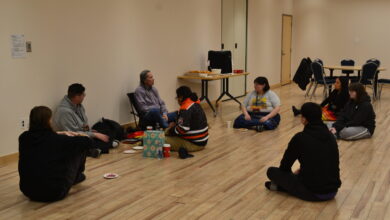Ask a prof: How concerned should we be about the measles exposure?
Dr. Lorne Tyrrell explains how measles can spread and the risk of the HUB Mall measles exposure.
 Nana Andoh
Nana AndohOn September 6, the University of Alberta sent out a notice to staff and students about a measles exposure on campus. Twice on August 31, once between 11:00 a.m. and 3:00 p.m. in HUB Mall, and again between 1:00 p.m. and 5:00 p.m. in the Multifaith Room in HUB Mall. There was an additional exposure in HUB Mall on September 2 between 10:00 a.m. and 5:00 p.m..
A small number of people may have also been exposed in a classroom, according the U of A’s notice. Alberta Health Services will contact those individuals directly.
Meanwhile, Alberta has been seeing rising measles cases for months, though it seems to be slowing down.
The Gateway spoke to Dr. Lorne Tyrrell, a U of A professor and the director of Li Ka Shing Institute of Virology, about the exposure and Alberta’s ongoing measles outbreak.
Risk to immunized students is low
Dr. Tyrrell explained that measles is a respiratory infection that is highly infectious. He said measles has an R value of 15, meaning that on average one infected person in an environment with people who are not immunized can infect at least 15 other people.
Measles causes red eyes, a sore throat, a cough, followed by a rash that begins in the head and neck and spreads to the body and then the limbs.
The good news is that those who have antibodies against measles, whether gained through vaccination or natural infection, are protected from contracting measles.
For those who are not immunized, Dr. Tyrrell said they do have cause for concern.
Measles has an easier time travelling in enclosed spaces. Though it’s still possible to travel in a more open space, like HUB Mall, it’s less likely to transmit the infection.
“If someone’s walking through the mall and they’re not in a confined space, the chance of getting it there are less,” Dr. Tyrrell said.
Not likely to turn into an outbreak, but still possible
The chances of this exposure leading to more measles cases depends on whether the people travelling through HUB Mall have antibodies, he explained.
“Most people do get vaccinated, but there has been a fair number of people in parts of Alberta where vaccination rates are well under even 60 or 70 per cent for measles, which is rather distributing to think that we have some low rates of immunization,” Dr. Tyrrell said.
“To prevent the virus from spreading widely, we need about 90 to 95 per cent vaccination,” Dr. Tyrrell said. “If there are people in HUB Mall that haven’t been vaccinated and are exposed, they are certainly susceptible to getting measles.”
At the U of A, it took six days since the initial exposure to notify students and staff. Dr. Tyrrell said the time it takes to notify people varies.
This is partly due to the fact that measles hasn’t been around for many years so people may not be familiar with the symptoms and with making a diagnosis. Once it’s known, people are usually notified pretty quickly.
But if it does take longer to notify people, it can make it more likely that the exposure will spread.
“If you have an exposure and the exposure goes on for a longer period of time, before precautions are taken, there is an increased risk to transmit the disease,” he said.
He said the overall risk of this exposure turning into an outbreak is pretty low, but there is still a risk that we may see more cases from the HUB Mall exposure.
“Measles is a good example of what happens when people let their guard down,” Dr. Tyrrell says
Dr. Tyrrell explained that many children who went to school got a mandatory vaccination for measles.
“That was true in Alberta, but there are parts of the province that have been anti-vaxers and they don’t often necessarily send their children to school where they would be vaccinated.”
He said these are pockets of people that are unvaccinated and this has led to some areas having high unvaccinated rates.
“In public health, whenever a disease disappears, people say ‘well, we don’t need to worry about it,’” Dr. Tyrrell said. “But you do need to worry about it, and you need to keep up your immunization.”
“Measles is a good example of what happens when people let their guard down and public health has done a good job, and people forget about it,” he said.
“I think [Alberta’s measles outbreak] will still be ongoing for a while because we haven’t caught up with all the vaccinations,” Dr. Tyrrell said. “I hope that some of it is being caught up with, but if we have a fairly high unvaccinated population and people get back into enclosed environments and school, and then universities … we could be seeing this for a while still.”




